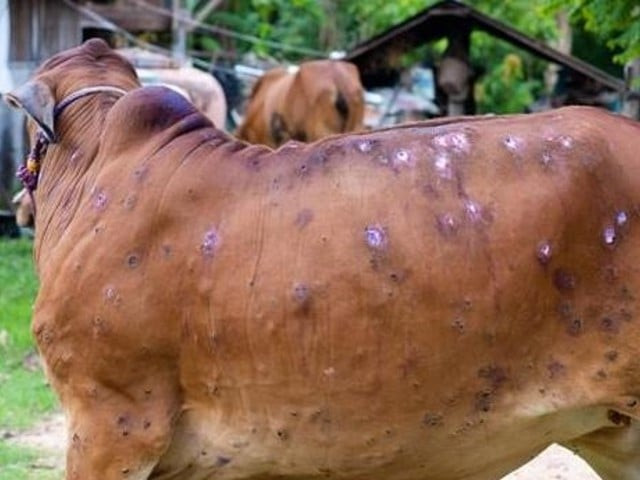Cattle farms yet to get LSD vaccine
Farmers have to rely on costly imported jabs despite the existence of local ones, given an apparent departmental rift

Despite the Sindh government developing a vaccine for the deadly Lumpy Skin Disease (LSD), which affects cattle, the vaccine is yet to reach cattle farms due to logistical hurdles and a lack of awareness among small farmers.
Originating in 2021, the exotic disease claimed the lives of hundreds of cattle across the country, which prompted the Sindh government to work on a vaccine, as importing the vaccine from countries like Turkey and distributing it for free was a costly affair.
However, presently, the LSD vaccine, which was produced at the national level roughly more than a year ago, remains unavailable in the market, compelling farmers to resort to expensive imported alternatives. At a cost of Rs 650 per packet, which can vaccinate up to 25 cattle, the locally produced vaccine could significantly ease the financial burden on farmers, especially during Eid-ul-Azha, a period marked by increased livestock trade. Nevertheless, that does not seem to be the case, as per Muhammad Saleem, a local cattle farmer.
“I have recently spent Rs 23,000 vaccinating my 23 cattle with imported doses, each costing Rs 1,000 rupees,” lamented Saleem. “We do not even want the locally produced vaccine for free, if the Sindh government could just offer it in the market, we would gladly purchase it, instead of the expensive imported one,” he added.
However, it seems that Saleem’s requests will go unresolved for the time being, as two government departments seem to be at odds over the distribution of the vaccine. While the Sindh Institute of Animal Health claims to supply the Lumpy vaccine to the Livestock Department, officials from the latter assert that no such supply has been received.According to Dr Benazir Kanwal, Deputy Director of the Sindh Institute of Animal Health, her department is only responsible for vaccine production, while the Sindh Livestock Department oversees distribution to farmers.
“The provincial livestock department purchases the vaccine from us and provides it free to registered farmers. However, it is true that only large-scale farmers are registered and thus smaller farmers do not get the benefits of the free inoculation drives,” clarified Dr Kanwal. In contrast, Dr Hizbullah Bhutto, informed that as far as he was aware the vaccine for LSD was still in its trial phase. “Hence, we are yet to receive the locally produced vaccine. Moreover, the department cannot purchase the vaccine on its own and provide it to farmers for free due to financial constraints,” asserted Dr Hizbullah.
When reminded that the department had provided the vaccine free of cost in the past, Dr Hizbullah confirmed that the Sindh Livestock Department had indeed distributed the imported vaccine for free about three years ago but currently with no signs of LSD present in Sindh, the inoculation drive was on hold. Be that as it may, Dr Kaleem Rajput, a veterinary doctor specialising in cattle treatment at a private clinic, was of the view that albeit LSD was currently inactive in the province, sporadic cases could still occur, which underscored the importance of biannual vaccination to prevent outbreaks.
“Therefore, the inoculation drive should continue as a preventive measure,” suggested Dr Kaleem while talking to the Express Tribune.
Published in The Express Tribune, April 14th, 2024.



















COMMENTS
Comments are moderated and generally will be posted if they are on-topic and not abusive.
For more information, please see our Comments FAQ